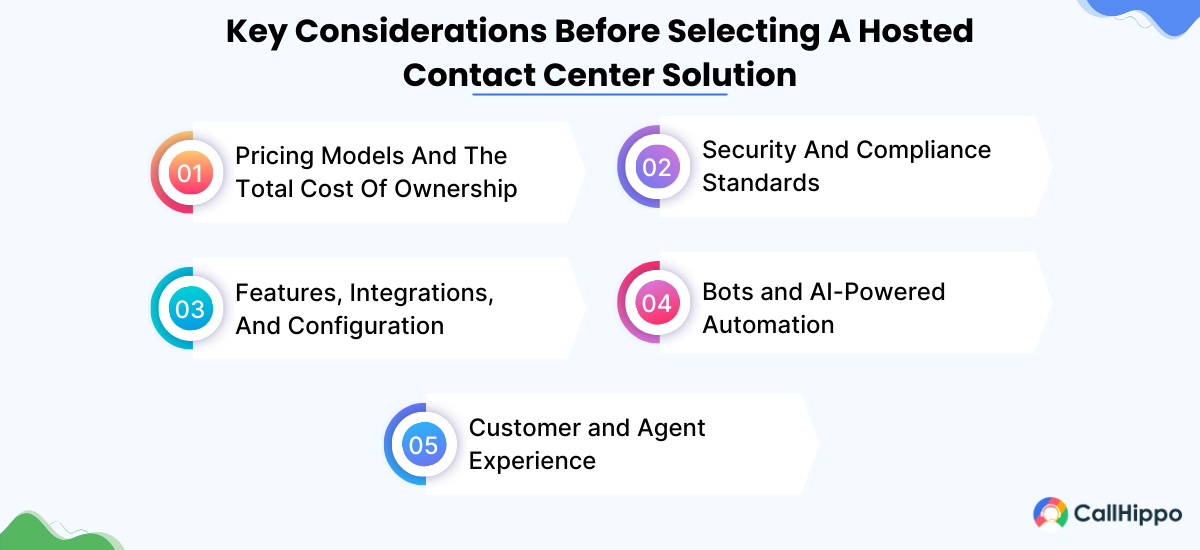In the past, call centers called for significant investments in technology, software, and extensive maintenance, restricting agents to physical offices.
Today, hosted contact centers address these concerns by offering vital omnichannel assistance over the cloud on a subscription basis. Hosted contact center solutions have lately gained popularity due to their lower cost and easier setup than traditional on-premises systems.
We will describe how a hosted contact center works, discuss the difference between a hosted contact center and a call center and an on-premise contact center, and offer recommendations on how to choose the best-hosted contact center solution.
What Is A Hosted Contact Center?
A hosted call center, also known as a cloud-based contact center, relies on technology situated outside your company’s premises to manage inbound and outbound calls. A third-party vendor provides this infrastructure, either on their premises, in a data center, or the cloud.
https://webcdn.callhippo.com/blog/wp-content/uploads/2024/06/Hosted-Contact-Center.jpg
Users need to connect to the remote server via a network to administer the contact center. In recent years, this approach has gained popularity among startups and organizations looking to modernize their outdated hardware.
How Does Hosted Contact Center Work?
A hosted contact center relies on a third-party service provider to maintain your customer communication infrastructure. Rather than purchasing and maintaining your equipment and software, you rent access to the provider’s secure data center or cloud platform.
The key components of a hosted service include:
1. Agents
Agents make calls using softphones on their computers rather than traditional desk phones. They can work from anywhere with internet access, offering greater flexibility than a centralized contact center.
2. Infrastructure
The vendor stores the contact center infrastructure, which includes servers, software, and telephones, in the cloud. This technique eliminates the need for on-premises hardware and software investments.
3. Routing
Incoming calls are routed to available agents using the vendor’s call-routing algorithms and ACD software.
4. Applications
Agents use web browsers to access contact center software. These apps include phone controls, CRM connection, ticketing, knowledge management, chat interfaces, and data dashboards and reporting capabilities.
5. Administration
The vendor is in charge of infrastructure, applications, and backup administration. Businesses can self-manage components like as agent management, call flow, and reporting using web interfaces.
6. Scalability
Compared to on-premise systems, cloud contact center platforms are more scalable, allowing organizations to withstand call volume changes while only paying for what they need.
7. Disaster Recovery
Distributed infrastructure improves business continuity and resilience as compared to centralized on-premise setups.
Difference Between Hosted Contact Center & Hosted Call Center
Here’s a table highlighting the key differences between a hosted contact center and a hosted call center:
| Aspect | Hosted Contact Center | Hosted Call Center |
|---|---|---|
| Communication Channels | Primarily supports voice communication | |
| Customer Interaction | Focuses mainly on voice-based customer interactions | |
| Agent Tools | Primarily provides tools related to voice calls, such as call handling and voicemail | |
| Reporting and Analytics | Generally focuses on call metrics and voice-related analytics | |
| Routing and Distribution | Utilizes call routing algorithms specifically for voice calls | |
| Scalability | Scales primarily in terms of voice call capacity | |
| Customer Experience | Enhances customer experience by providing efficient voice call handling | |
| Implementation | Simpler to implement as it focuses on voice communication | |
| Cost | Generally lower costs due to focus on voice-only communication |
Difference Between Hosted Contact Center & On-Premise Contact Center
Here’s a table outlining the differences between a hosted contact center and an on-premise contact center:
| Feature | Hosted Contact Center | On-Premise Contact Center |
|---|---|---|
| Infrastructure | Owned and maintained by the business onsite | |
| Initial Investment | High initial capital expenditure for hardware and software | |
| Maintenance | Businesses responsible for ongoing maintenance and updates | |
| Scalability | Limited by physical hardware capacity, scaling can be costly | |
| Agent Location | Agents typically work from a centralized location | |
| Routing | Customizable but managed in-house | |
| Flexibility | Less flexible, changes can be time-consuming and expensive | |
| Administration | Fully managed in-house | |
| Cost Model | Significant upfront cost with ongoing operational expenses | |
| Security | Security is managed in-house, requiring dedicated resources | |
| Integration | It can be complex, depending on the existing infrastructure |
Factors To Consider Before Selecting A Hosted Contact Center Solution
Choosing the right hosted contact center software can be challenging, especially given the issues of cost, compliance, security, and functionality. To help you make an informed selection, consider the following crucial factors:

1. Pricing Models And The Total Cost Of Ownership
Don’t just think about the monthly payments or upfront charges. Consider the additional costs for integrations, storage, maintenance, and training. Understand the total cost of ownership over the technology’s life cycle. Some suppliers provide flexible, usage-based pricing that adapts to your demands.
2. Security And Compliance Standards
Ensure that your vendor has strong data protection regulations and processes in place. It should include disaster recovery strategies, redundant data centers, 24-hour monitoring, and real-time network status updates.
Check the hosted call centers certifications and compliance with applicable requirements such as GDPR, PCI, SOC 2, ISO/IEC 27001, and industry-specific standards like HIPAA.
3. Features, Integrations, And Configuration
Determine the essential characteristics your company requires. Look for a fully integrated omnichannel strategy to manage all communication channels, with the ability to add new ones as needed.
Use automation solutions like IVR, automatic call distribution, and predictive dialers to improve agent efficiency and streamline staff management. Check for dependability, uptime guarantees, geographical redundancy choices, and scalability in your hosted contact center services.
4. Bots and AI-Powered Automation
AI-based automation is critical for effectively managing the growing number of digital channels. Implement conversational AI to cut hold times, fix issues more quickly, route calls to the appropriate operators, and increase customer satisfaction. AI can continuously learn from encounters and enhance service quality.
5. Customer and Agent Experience
Your software should improve both the customer and agent experiences, as they are interrelated. Agent experiences have a substantial impact on customer satisfaction. Choose a solution that provides agents with a user-friendly interface while minimizing distractions and repetitive chores to increase productivity and attention.
With CallHippo
- Call Performance Score
- Talk Ration
- Call Center Analytics

Conclusion
Switching to a hosted call center can dramatically cut expenses for infrastructure, equipment, and maintenance. It improves agent experience with automation and remote working options, allowing companies to retain more employees.
As technology advances, the future of hosted contact centers is bright, with breakthroughs paving the way for individualized customer interactions and increased global reach. Adopting hosted contact centers now is critical for organizations hoping to secure an excellent future for themselves and their clients.
FAQs
1. How to document sales calls?
Document sales calls by noting key details: date, time, participants, purpose, discussion points, objections, resolutions, next steps, and follow-up actions. Use CRM software for organized and accessible record-keeping.
2. What is a sales call sheet?
A sales call sheet is a document that details scheduled sales calls, such as customer information, objectives, discussion topics, and follow-up tasks, allowing sales teams to keep organized and focused.
3. How do you structure a sales call?
To structure a sales call, begin with a warm greeting, then identify the customer’s problems, explain your solution, answer any objections, emphasize benefits, and conclude with a clear call to action.
4. What are the 4 essential elements of the sales call?
The 4 essential elements of a sales call are:
- A meticulously crafted presentation
- Illustrative examples or case studies of your product or service
- External endorsements
- Video endorsements
5. What are the benefits of a hosted call center?
A hosted call center offers cost savings, scalability, remote work flexibility, minimal maintenance, enhanced disaster recovery, and seamless integration with CRM systems, improving overall efficiency and customer satisfaction.

Subscribe to our newsletter & never miss our latest news and promotions.









